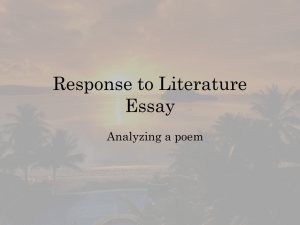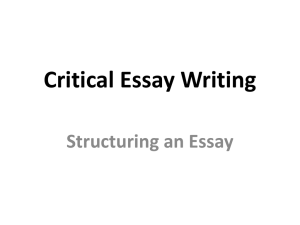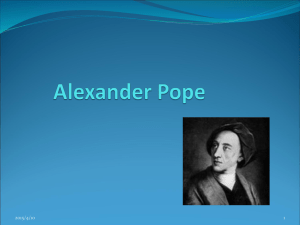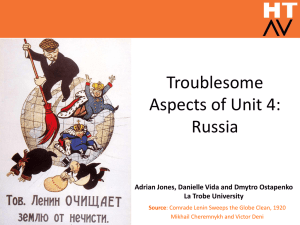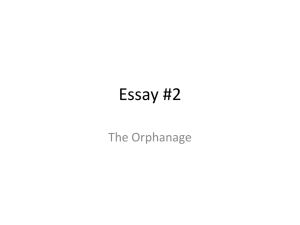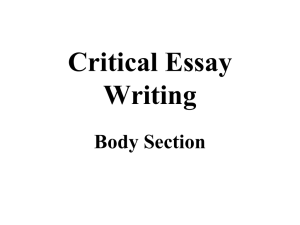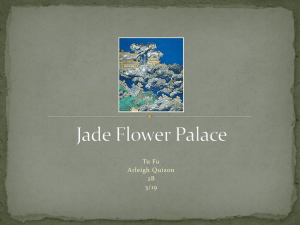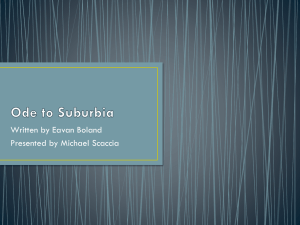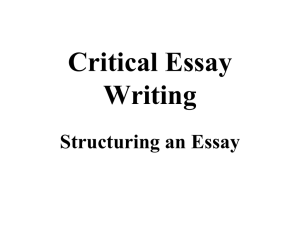Response to Literature Essay
advertisement
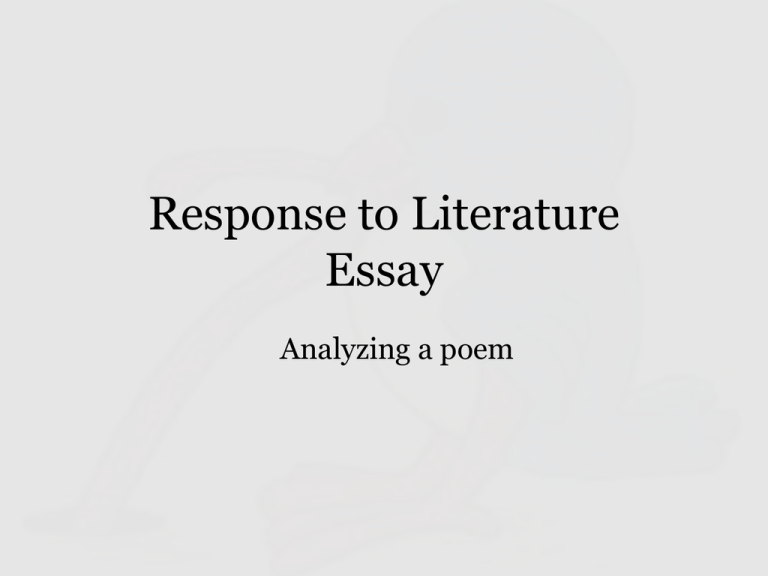
Response to Literature Essay Analyzing a poem Objective: We will annotate and analyze the prompt and poem • Task 1: read the poem (first time) • Task 2: read the poem (second time) and annotate (write in the margin) what is happening in each stanza. – Pair share Objective: We will annotate and analyze the prompt and poem • Task 3: read the prompt and determine key words. What is it asking you to do? – Find the parts of the poem where the bird and the speaker “interact” and number them – Pair share Objective: We will annotate and analyze the prompt and poem • Task 4: Determine the theme of the poem – What is the speaker’s description of the bird when it doesn’t see the speaker? – What happens when the bird sees the speaker? – What does the bird do after the speaker’s interaction? – What action/imagery is going on in the second stanza? – What are TOPICS the poem is about? – What seems to be the poem’s message about those topics? (Theme=THE MEssage) – Write the theme on the prompt below the writing task box Objective: We will write an Introductory ¶ for the response to literature essay • Formula for the Introduction –Hook –Overview of text with TAG (Title, Author, Genre) –Thesis Statement (What are you going to prove or argue in your essay?) • HINT! Your thesis should be an answer to the prompt, so you can use some of the same words Objective: We will write an Introductory ¶ for the response to literature essay • Example • Prompt: Pat Mora’s “Same Song” shows what a daughter and son do to make themselves appear attractive in an attempt to fit in. Write an essay in which you analyze how the imagery affects the theme of the poem. Provide evidence with textual references to support your analysis. Objective: We will write an Introductory ¶ for the response to literature essay • Example Introduction • Regardless of who you are, adolescence is a difficult time period because teenagers constantly feel pressured to fit in and be accepted. Case in point, in Pat Mora’s poem “Same Song,” a sixteen year old boy and twelve year old girl feel pressured to fit a certain image but are continually unhappy by their inability to meet that standard. The daughter meticulously applies makeup and curls her hair while her brother unceasingly works out all in an attempt to improve their looks. In the poem, Mora uses an array of vivid imagery to develop the theme that young people are often pressured by society to fit a certain image. Objective: We will write an Introductory ¶ for the response to literature essay • Your turn! • Hook (only needs to be 1 sentence) • Example: Regardless of who you are, adolescence is a difficult time period because teenagers constantly feel pressured to fit in and be accepted. • Share! • Whole class: How long is a Hook? Objective: We will write an Introductory ¶ for the response to literature essay • Your turn! – Overview of text with TAG (Title, Author, Genre) • Case in point, in Pat Mora’s poem “Same Song,” a sixteen year old boy and twelve year old girl feel pressured to fit a certain image but are continually unhappy by their inability to meet that standard. The daughter meticulously applies makeup and curls her hair while her brother unceasingly works out all in an attempt to improve their looks. • Share! • Whole class: How long is the Overview? Objective: We will write an Introductory ¶ for the response to literature essay • Your turn! – Thesis Statement (What are you going to prove or argue in your essay?) • HINT! Your thesis should be an answer to the prompt, so you can use some of the same words • In the poem, Mora uses an array of vivid imagery to develop the theme that young people are often pressured by society to fit a certain image. • Share! • Whole class: Do you know what a thesis does? Objective: We will write a body ¶ for the response to literature essay • Formula for the Body Paragraphs –Topic sentence (what is ¶ going to be about?) –Supporting Evidence (quote from text) –Explain evidence (what does it mean?) –Transition (what are you talking about next?) Objective: We will write a body ¶ for the response to literature essay • Example Body ¶ • In the first stanza, Mora uses imagery to show how her daughter unsuccessfully tries to fit society’s definition of beauty. Her daughter “peers into that mirror, mirror on the wall,” looking for approval and recognition that she is attractive. Instead, the only response she receives is, “not fair.” Mora’s daughter allows an outside force, the mirror (society), to tell her whether she is worthy rather than to make her own judgment. The rejection she feels can contribute to feelings of worthlessness, low self-esteem, and a negative body image that can follow her throughout the rest of her life. Mora’s impressionable and naïve daughter does not realize that she is trying to conform to an unobtainable measure of beauty that will only lead to disappointment and sadness. Furthermore, imagery in the second stanza supports the idea that her son also struggles with body image. Objective: We will write a body ¶ for the response to literature essay • Your turn! • Topic sentence (what is this paragraph going to be about?) • In the first stanza, Mora uses imagery to show how her daughter unsuccessfully tries to fit society’s definition of beauty. • Share! • Whole class: Do you know what a topic sentence does? Objective: We will write a body ¶ for the response to literature essay • Your turn! • Supporting Evidence (quote from the text) • Her daughter “peers into that mirror, mirror on the wall,” looking for approval and recognition that she is attractive. • Share! • Whole class: How long is the Supporting Evidence? Objective: We will write a body ¶ for the response to literature essay • Your turn! • Explain Evidence • Instead, the only response she receives is, “not fair.” Mora’s daughter allows an outside force, the mirror (society), to tell her whether she is worthy rather than to make her own judgment. The rejection she feels can contribute to feelings of worthlessness, low self-esteem, and a negative body image that can follow her throughout the rest of her life. Mora’s impressionable and naïve daughter does not realize that she is trying to conform to an unobtainable measure of beauty that will only lead to disappointment and sadness. • Share! • Whole class: How long is the Explaining Evidence? Objective: We will write a body ¶ for the response to literature essay • Your turn! • Transition (what are you going to talk about next?) • Furthermore, imagery in the second stanza supports the idea that her son also struggles with body image. • Yet the speaker soon disrupts the bird. • Dickenson continues this message in the X stanza. • However, the bird does not remain in an uninterrupted state for long. • Even after witnessing this purity of nature, the speaker cannot resist trying to interfere. • Share! • Whole class: What does the Transition sentence do? Objective: We will write a body ¶ for the response to literature essay • Example Body ¶ • In the second stanza, Mora utilizes imagery to convey how her son’s routine of working out is not only time consuming but ultimately futile. She observes how her “son jogs a mile in the cold dark/then lifts weights in the garage/curls and bench presses/expanding biceps, triceps, pectorals.” Society commonly portrays males as having ripped physiques and being in shape. Accordingly, the son believes big muscles are the key to improving one’s self image. Unfortunately, the son falls prey to this erroneous perception which in turn leads to his disappointment. When the son “peers into that mirror, mirror and frowns too” readers realize both the son and the daughter have been duped into buying into an unobtainable paradigm of beauty. Objective: We will write a body ¶ for the response to literature essay • Your turn! • Topic sentence (what is this paragraph going to be about?) • In the second stanza, Mora utilizes imagery to convey how her son’s routine of working out is not only time consuming but ultimately futile. Share! • Whole class: Do you know what a topic sentence does? Objective: We will write a body ¶ for the response to literature essay • Your turn! • Supporting Evidence (quote from the text) • She observes how her “son jogs a mile in the cold dark/then lifts weights in the garage/curls and bench presses/expanding biceps, triceps, pectorals.” • Share! • Whole class: How long is the Supporting Evidence? Objective: We will write a body ¶ for the response to literature essay • Your turn! • Explain Evidence (quote from the text) • Society commonly portrays males as having ripped physiques and being in shape. Accordingly, the son believes big muscles are the key to improving one’s self image. Unfortunately, the son falls prey to this erroneous perception which in turn leads to his disappointment. When the son “peers into that mirror, mirror and frowns too” readers realize both the son and the daughter have been duped into buying into an unobtainable paradigm of beauty. • Share! • Whole class: How long is the Explaining Evidence? Objective: We will write a conclusion ¶ for the response to literature essay • Formula for the Conclusion –Rephrase Thesis –Address supporting reasons/Argument Summary (what were your body paragraphs about?) –Provide significance or lesson learned Objective: We will write a conclusion ¶ for the response to literature essay • Example conclusion ¶ • Throughout the poem, Mora uses imagery to repeatedly conveys the theme that young adults strive to fit the ideal image created by society. By using precise descriptions, she clearly describes the process the daughter goes through every morning to make each element of her appearance “beautiful”—her clothes, her hair and her makeup. Similarly, Mora paints an equally detailed picture of the son as he works out for what seems to be hours trying to achieve the perfect build. In the end, Mora conveys the notion that neither child is pleased with how they look and they are frustrated that so much time and energy has been spent trying to achieve the unachievable which is “not fair.” Objective: We will write a conclusion ¶ for the response to literature essay • Your turn! • Rephrase Thesis (go back to original thesis and restate • • • • what you said using new words) Original Thesis: In the poem, Mora uses an array of vivid imagery to develop the theme that young people are often pressured by society to fit a certain image. Restated Thesis: Throughout the poem, Mora uses imagery to repeatedly conveys the theme that young adults strive to fit the ideal image created by society. Share! Whole class: Does the Restated Thesis use the exact same words as the original thesis? Objective: We will write a conclusion ¶ for the response to literature essay • Your turn! • Address reasons supporting thesis/ Argument Summary (summarize what you talked about in your body paragraphs) • By using precise descriptions, she clearly describes the process the daughter goes through every morning to make each element of her appearance “beautiful”—her clothes, her hair and her makeup. Similarly, Mora paints an equally detailed picture of the son as he works out for what seems to be hours trying to achieve the perfect build. • Share! • Whole class: What does the Argument Summary do? Objective: We will write a conclusion ¶ for the response to literature essay • Your turn! • Propose lesson learned or significance (why is this topic important? Is there a lesson to be learned?) • In the end, Mora conveys the notion that neither child is pleased with how they look and they are frustrated that so much time and energy has been spent trying to achieve the unachievable which is “not fair.” • Share! • Whole class: How long is the purpose/lesson learned
